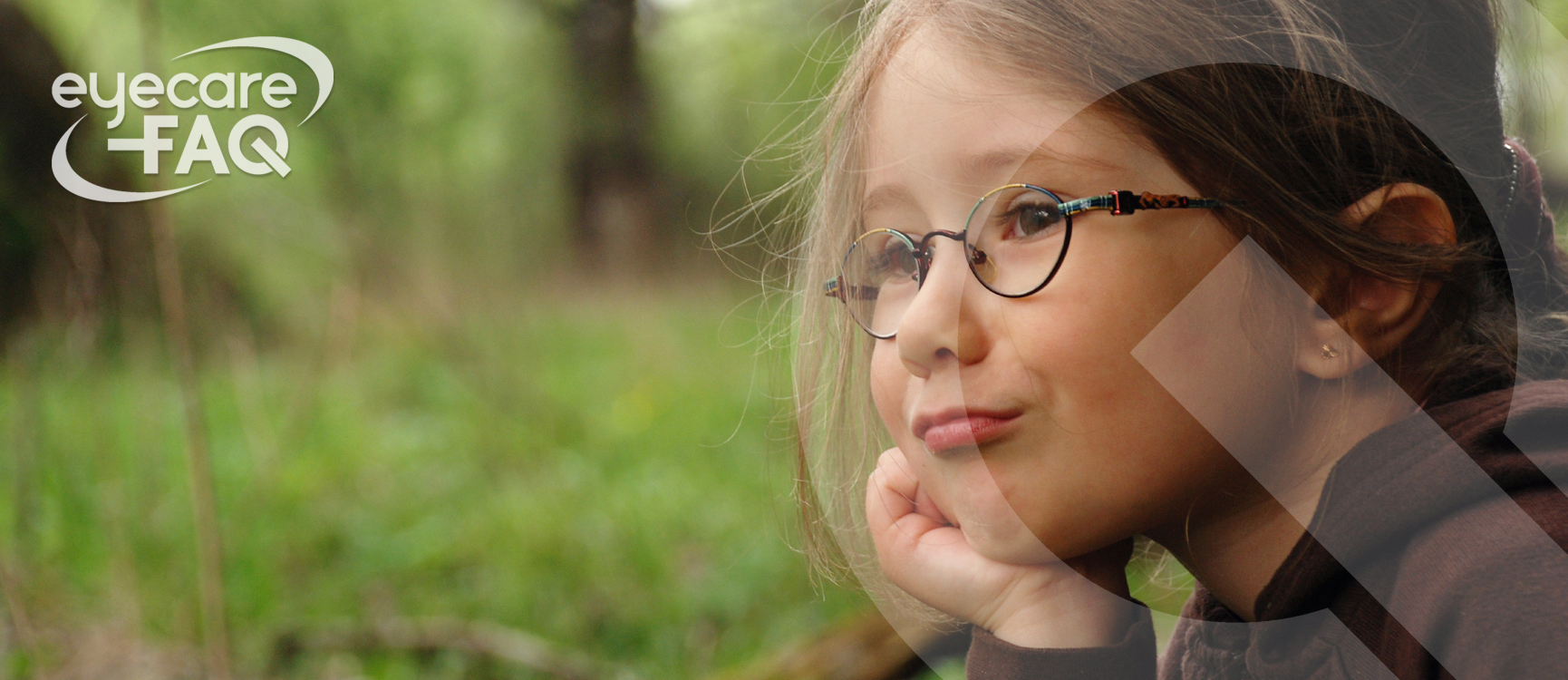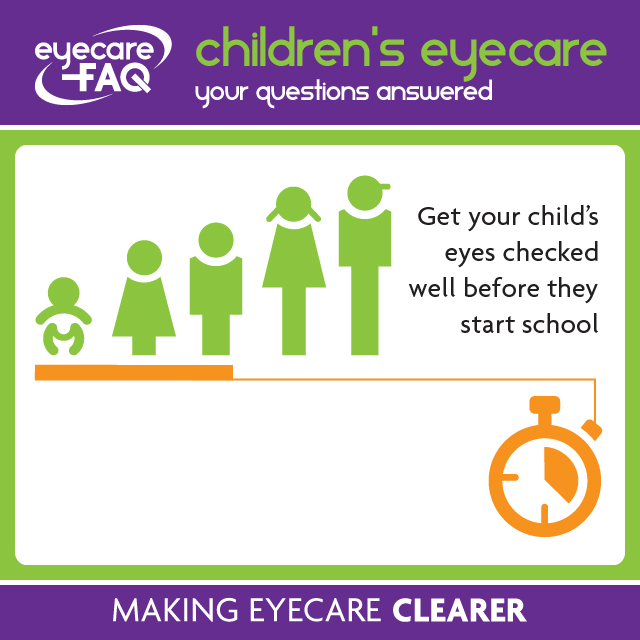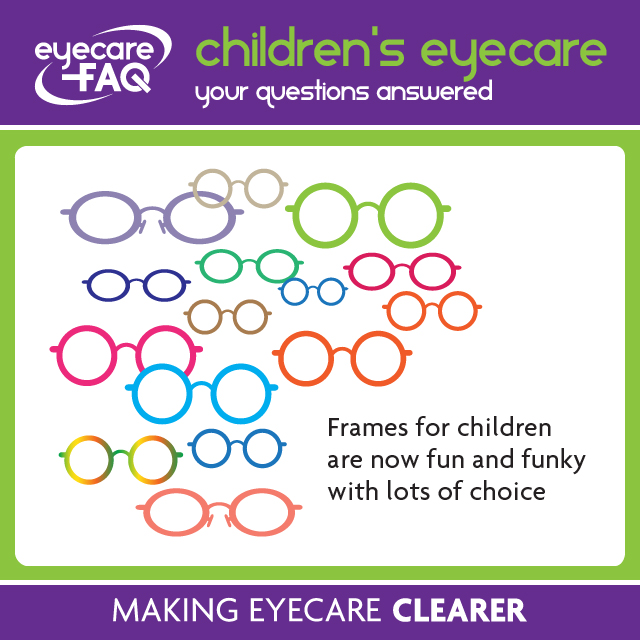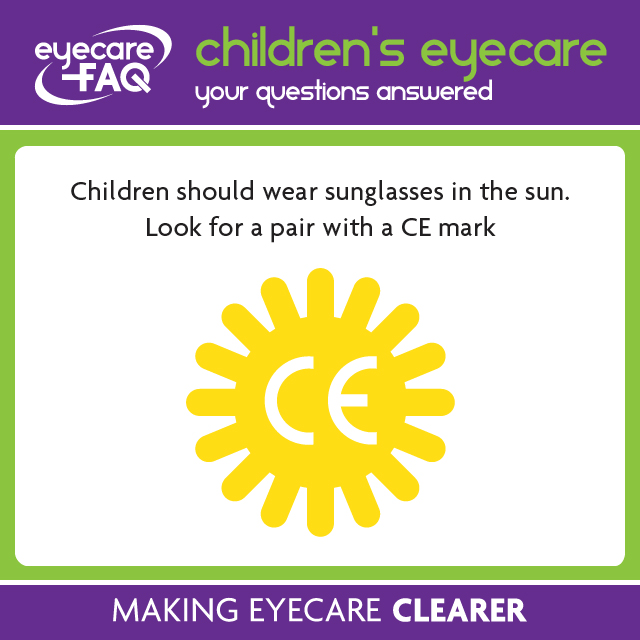Should I get my child’s eyes tested?
Has your child had their eyes tested? If you’ve been told that your child is too young, you should only get their eyes tested if they have a problem, or they have to be able to read to have an eye test, read on so your child doesn’t miss out on a vital health check.
Opticians can look after the eyes of children, toddlers and even babies. Often, the sooner an eye problem is detected, the better. So if you have any concerns about your child’s eyes, the first step is to speak to your local optician. If you don’t already attend an optical practice yourself, ask friends for recommendations. Some practices specialise in eye care for small children, while others are well set up for children with special needs so there is no need for any child to miss out on eye care.
Find an optician in your area click here.
When should I get my child’s eyes tested?
If you’re wondering when to start getting your child’s eyes checked, do make sure that they are seen as a toddler, well before they start school. In most, but not all parts of England, there is a children’s vision screening programme where they check vision, asses for binocular vision problems that could impact on a child’s education abilities and can refer to an optician if required.
Talk to your local optician to find out what is available near you.
Some eye conditions can be treated more effectively if they are discovered by the age of three.
Things to look out for:
- Children screwing their eyes up or rubbing their eyes.
- Children who are clumsy, bump into things.
- Children who have problems with coordination eg catching or kicking a ball.
- Children sitting very close to the TV or with their nose too close to a page to read.
- Children who refuse to read or have difficulties concentrating.
- A child that perceives that text on a page doesn’t stay in a straight line but slopes.
- A child who is introverted or a “day-dreamer”.
- A child who is disruptive or have a short attention span.
- A child undergoing long-term medication – there are a number of different medications which children which may have eye-related side effects and could impact negatively on healthy sight eg steroids, ADHD drugs, anti-bedwetting drugs, antihistamines, anti-depressants).
- Children complaining of headaches – most headaches don’t have an ocular cause; however, some children may have an uncorrected refractive error and/or they may have a binocular vision problem that causes headache.
How much does it cost to take my child for an eye test?
If you’re concerned about the cost of an eye test for your child, don’t worry! Children under sixteen, as well as those aged 16-18 in full time education get the cost of their eye test covered by the NHS. Children in these groups will also get a voucher towards the cost of a pair of spectacles.
In Scotland all examinations are covered by the NHS and if spectacles are required a voucher can be provided if the child is under 16 years of age or under 19 and in full time education.
How often should my child have their eyes tested?
Once your child has had their eyes checked, the optician will let you know how often they need to visit. For many people, every two years is fine, but they may suggest your child visits every six months or every year, depending on their particular needs.
Who can help me choose glasses for my child?
Did you know that a registered dispensing optician is the best person to help you get glasses spectacle’s for your child?
A dispensing optician is trained to help you choose the best frame for their prescription requirements and make it appealing to your child. There is plenty of choice of fun, funky and fashionable frames now.
Beyond frames, there are many different types of lenses available, and your dispensing optician can guide your choices there too. Some children will benefit from thinner lenses, while others will want tougher lenses and well-designed frames that make it safe to play all sorts of sports. The optician can also discuss the option of contact lenses which will appeal to older children.
Ask your local optical practice if you can speak to a dispensing optician when you next need eye care advice or spectacles for your child.
What do I do if my child’s specs are slipping?
Firstly, when did you last get your child’s spectacles adjusted? Children’s faces change shape and size as they grow, they may pull their spectacles off and on with one hand, and so you may need to visit the optician regularly for adjustments. Some people need very few adjustments, but with growing children you may find periods where you need to visit every few weeks to stop the specs slipping. The Dispensing Optician is trained to ensure that your spectacles fit well, and will be happy to help however often you need to return.
My child’s specs tend to slip: how do I choose a pair that won’t?
Children have smaller noses than adults so it can be difficult to find a perfect fit. Ask your Registered Dispensing Optician to show you a selection of frames that will work well for your child. Smaller frames tend to be lighter, and hence less likely to slip. Ask about frame ranges specifically designed for children, as these will fit better than scaled down versions of adult frames. Discuss whether plastic or metal frames are the best option for your child. In some cases frames with sprung sides can help them fit better and retain their shape. Return to the optician regularly for adjustments as this helps counteract the problem of slipping specs too.
Why is it a problem if my child’s specs slip down their nose?
Every spectacle lens has a centre, and your child should be looking through the centre of their lenses. If your child’s spectacles slip they may experience distorted vision when they look through the top of the lens, or they may look over the top of the spectacles and gain no benefit from them at all. Call back in to speak to your Registered Dispensing Optician if your child’s spectacles are slipping. Don’t be afraid to keep coming back: children’s faces change shape and they can be rough with their glasses so they may need regular frames adjustments.
My child wears specs, what are their options when playing sport?
Wearing glasses shouldn’t stop your child taking part in a whole range of sports. If you feel that your child is being held back from sports by their eye wear, talk to your dispensing optician. A dispensing optician is trained to solve all sorts of eye wear issues, and knows the best frames and lenses to help your child. They can also discuss the option of contact lenses which will suit children as they get older or specially designed sports goggles.
When choosing specs for a child, ask about polycarbonate and Trivex lenses: both are more robust than regular plastic lenses. Plastic frames, without adjustable pad arms, can be the safer choice, and there are specific frames designed for sport too. Think about getting a sport band for your child to hold their specs in place.
With the right specs or lenses, your child can go on enjoying all the sports that they love.
Find out more about sport eyewear here.
Children and contact lenses
Does your child love their glasses?
With more fun and funky frames on offer, often customised with favourite characters, small children can look on glasses as a great accessory. As they get older, though, they may want to think about contact lenses, whether it is for appearance, to make it easier to play sport, or even to fit in with friends. These are all important reasons to the child, and can help them be really motivated to wear contact lenses.
Whatever your child’s age and motivation, the next thing to do is to pop into your local optical practice. Ask to speak to the optometrist, contact lens optician or dispensing optician. They can advise you and your child about what wearing contact lenses involves. If you want to go ahead, you can then book a contact lens trial where your child can learn more about lenses and try them out.
What age can my child start wearing contact lenses?
There is no fixed age for children to start wearing lenses, but here are a few factors to consider. Getting used to contact lenses can take a little while. Your child needs to be motivated to learn how to put the lenses in and out: they need to be able to do this themselves. They also need a certain amount of discipline: it’s important not to wear the lenses for more hours than advise by the optician, so think about whether your child can do this. There is also a routine to learn for keeping the lenses clean and hygienic. While disposable lenses make life easier, nothing can get rid of the need to wash your hands every time you put the lenses in or out.
The younger the child, the more you will need to help with reminders about cleanliness and wear-time. A child who is motivated to wear lenses by the love of a hobby like horse-riding or ballet might be ready to start wearing lenses from the age of seven or eight, but ask your optician who can give you advice tailored to your child.
Worried about squint or lazy eye?
If there is a big difference between your child’s eyes, one eye may do more work than the other. Over time, the less-used eye can become lazy, which is known as amblyopia. A squint occurs when the eyes do not work well together, and consequently one eye may appear to drift out or in, especially when your child is tired. This can lead to one eye working less well than the other.
Squints and lazy eyes can be detected during an eye test. The optometrist will check each eye, and will also test how well they work together. It is important to get your child’s eyes checked as a toddler. Detecting a lazy eye at this stage means that treatment will be as effective as possible as the eye is still developing.
If the optometrist thinks your child has a squint or lazy eye, they may be prescribed spectacles, which can help straighten a squint. Your child may also be referred to the hospital to see an orthoptist. The orthoptist may suggest ‘patching’; covering the better eye to encourage the lazy eye to work. They may prescribe exercises to help your child’s eyes work together. Some children may also be offered surgery to improve the way the eyes co-ordinate.
So, act now. Make sure your toddler gets a thorough eye examination at your local optical practice. Picked up early, squint and lazy eye can be treated so your child’s vision develops properly.
Find out more about squints and lazy eye here.




